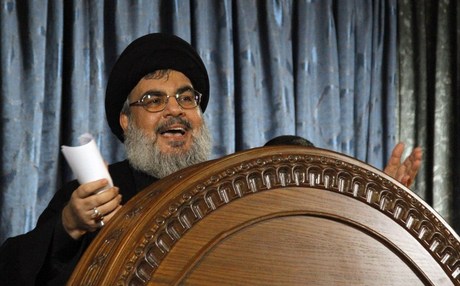BISMILLAHIRRAHMANIRRAHIM
ان تنصرو الله ينصركم و يثبت اقدامكم

ان تنصرو الله ينصركم و يثبت اقدامكم
Nasrallah Says Resistance to Emerge 'Stronger' if Iran Deal Sealed

SOLAWAT
Hizbullah Chief Sayyed Hassan Nasrallah assured on Wednesday that the resistance will emerge stronger in case a deal was struck between Iran and international powers currently negotiating over Tehran's nuclear program.
Nasrallah surprised his supporters on Wednesday evening when he made a rare public appearance in the Beirut neighborhood of Rweiss, on the tenth night of Ashura.
A day before the annual popular procession is expected to take place, he warned that “bombings, bloodshed and booby-trapped car explosions” could take place, but he stressed, however, that nothing will stand between “people and (Imam) Hussein.”
"If after the negotiations with Iran things head towards a war, everyone must get worried, although others will become more preoccupied than us,” Nasrallah said in his speech.
"But if an accord was reached, our party will become stronger and with a better presence locally and regionally,” he added.
He elaborated: “When negotiations take place, usually allies of the communicating poles get worried but we are not. Our allies do not worry us and we have two allies only, Syria and Iran, that both never abandoned us.”
“Do you expect that Iran will ask Hizbullah to abandon its rights, resistance and hand over the country to the other faction? Those who know Iran's history know that this will not happen.”
Iran and world powers failed to agree a deal on Tehran's disputed nuclear program at talks in Geneva at the weekend but are planning to meet again on November 20 for further negotiations.
Western diplomatic sources say the two sides were close to a deal, but that Iran backed away because it was unhappy with some of the wording in the text presented by the six powers.
They have been negotiating with Tehran for years over its nuclear program, which some suspect is aimed at developing a nuclear weapon -- a claim Iran vehemently denies.
Nasrallah had started his Wednesday speech by pointing out to Israel's “efforts to push for a war in the region.”
He said: "There is no doubt that Israel is pleased to observe what is happening in the Arab and Islamic world, and to see the killings and the disputes between nations and inside each country and each society.”
Nasrallah continued: “It used all its power lately to prepare for an attack on Syria and today while the P5+1 are negotiating with Iran, (Israeli Prime Minister Benjamin) Netanyahu gets furious and tries to obstruct an accord and reaches out to his Arab allies.”
“Any accord that prevents a war in the region is rejected by Israel. It wants a war that secures its power and security.”
Nasrallah accused some Arab countries of acting similarity to Israel by rejecting any political solution in Syria and an international agreement with Iran.
Addressing Saudis, Qataris, Omanis, Kuwaitis and Emiratis, asked: “Where would a war in the region lead to? Israelis know very well, and their allies as well, that they can start a war anywhere but they cannot limit it to a certain region.”
Regarding reports saying Israel has installed devices to spy on Lebanese communications, Nasrallah remarked that Lebanon “has always been under threat.”
“The Lebanese must know that everything, from phone calls to things shared on the internet, is spied on,” he said.
The Hizbullah chief announced his readiness to confront this issue, if the Lebanese state fails to do so.
“If the state does not do anything to deal with this matter, the resistance will do so many things,” he stated.
“When the state is incapable, the resistance will not give up its responsibility and we are ready to assist in this respect.”
Speaker Nabih Berri revealed last Wednesday that Israel had set up a number of espionage stations along its border with Lebanon, starting from al-Naqoura passing by Khayyam all the way to Sheba.
The biggest espionage station is allegedly installed in al-Abbad and Jan al-Alam areas, which are located near the U.N. demarcated Blue line.
Tackling local political concerns, the Shiite leader accused Saudi Arabia of obstructing the formation of a new cabinet.
“There is a Saudi decision that calls on the March 14 alliance not to form a new cabinet,” he said
He continued: “We have advised them (March 14) to separate Lebanese matters from the Syrian crisis and not to bank on the developments of the neighboring country's war.”
“All facts indicate that things are heading towards a direction that is not desired by Saudi Arabia. All those waiting for a victory in Syria to form a cabinet, we tell them you will not win in the Syrian war.”
Nasrallah urged the formation of a new cabinet that is composed of 9 ministers from the March 14 coalition, 9 ministers from the March 8 alliance, in addition to 6 figures associated with President Michel Suleiman and premier-designate Tammam Salam.
He warned: “The collapse of the state's bodies and institutional vacuum cannot be dealt with by a caretaker cabinet.”
“We want a 9-9-6 council of ministers that preserves the rights of everyone.”
SOLAWAT
No comments:
Post a Comment